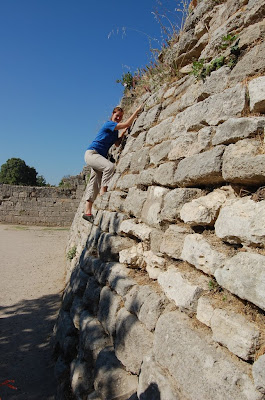
Left on the two week trip yesterday morning. After a few hours of sitting on a very uncomfortable bus, we stopped by the site of the Battle of the Gallipoli, one of the most important battles of World War I. The site of the battle as you can see from the map is strategically important - whoever controlled the peninsula would supposedly control the Dardanelles Straight. If the allies could win the battle and take the Dardanelles, Istanbul would be quick to fall and Russia could be provided more supplies for the Eastern Front.
Interestingly, the Battle of Gallipoli positioned two forces - the Turks and the Australians and New Zealand Army Corp (known as ANZAC) that had never had any animosity. But the troops engaged in battle for nine months until the Allies were forced to retreat following their defeat by one Mustafa Kemal, known as Ataturk (see the long blog post about him below).
Both sides took a combined casualty list of 500,000 men, of whom maybe 150,000 died, primarily on the Ottoman side. Here's a picture of a ANZAC cemetary. The beach behind it was used as the landing spot for the force - they had to climb those cliffs under gunfire to try to push back the Turks.


Nevertheless, after nine months of fighting, the Turks and the ANZACs developed a sense of friendship and respect that they have to this day. Here are some moving words provided by Ataturk - one of the main Ottoman generals during the battle, 20 years after the battle finished:
"Those heroes that shed their blood and lost their lives.. you are now lying in the soil of a friendly country. Therefore rest in peace. There is no difference between the Johnnies and the Mehmets to us where they lie side by side here in this country of ours.. You the mothers who sent their sons from far away countries wipe away your tears. Your sons are now living in our bosom and are in peace. Having lost their lives on this land they have become our sons as well."
-Mustafa Kemal Ataturk
Clayton brought up an interesting conversation with some of the Australians in our group who said that Gallipoli is as much of a big deal to them as it is to the Turks who won. It was the Australian and New Zealanders first war experience, and it did much to form their national identity.
We also got a chance to dip our feet in the Aegean Sea for the first time - it felt good:

After Gallipoli we crossed the Dardanelles Straight to Cannakale, where we spent the night. We went to a nice restaurant then headed to a sports bar, where we saw Turkey upset the Czech Republic 3-2 in the last 15 minutes of the game. It was incredible - wait to see a blog post about it soon.
Today we got on the bus and headed to the legendary ruins of Troy. We had seen the wooden horse from the movie (which was actually made of fiber glass), and saw the other one that Turkey recreated. The ruins weren't impressive in and of themselves, but just imagining the Trojan war from 3000 years ago in which, according to Homer, 1000 ships and 100,000 men attacked the city because Paris, son of Priam and brother of Hector, had taken Menelaus' wife Helen with him back to Troy. Here's a picture of Zoe climbing the wall of Troy VI, the Troy of Homer's epic.

After Troy, we went on another bus ride to Bergama, where the ancient city of Pergamum is located. The city was once the center of a great commercial empire, but was eventually assimilated into the Roman Empire. The city itself was built at sea level, as it was a port, but the main ruins - the acropolis, the temple of Athena, and the former ruins of the fabled temple of Zeus (which, according to the tour guide, was sold to German archaeologists for money used to build Dolmabahce Palace in Istanbul) were all located on top of a mountain with fantastic views of the city and landscape.


The view from the top:

Then we took another 4 hour bus trip to Selcuk, in the south of Turkey, and had a fantastic dinner on the terrace of the Australian and New Zealand Guest House, where we're spending the night. Tomorrow, we'll see the ruins of Ephesus, the Virgin Mary's house where she died, the Temple of Artemis, and the beach.
No comments:
Post a Comment